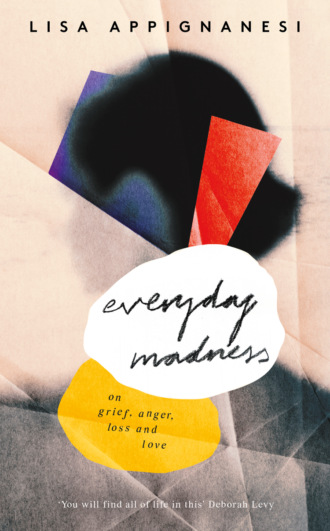
Полная версия
Everyday Madness: On Grief, Anger, Loss and Love
I was a star Pollyanna: though I’m a terrible and impatient nurse, I seem to be able to see the bright lining of most clouds, even thunderous ones. That night, I couldn’t. It might have occurred to me then, or perhaps it was later, that no one at the hospital – in all respects a wonderful and pioneering institution – ever talked of death. They talked only of chances. We were gamblers in a high-tech casino, playing against unknown odds – unknown not only because of the newness of the treatment but because each body, let alone each mind and set of emotions, is so uncooperatively individual.
That evening, we had watched a DVD of some stand-ups and laughed uproariously. In the middle of the night, John fell over on his way to the bathroom some three metres from the bed. I was meant to take him to the clinic if that happened. Falling. It was a signal we had been warned of. He was in neutropenia – a pretty word used to describe a scary state of no immunity in which infections can rampage. It was four days after Day Zero – the apocalyptic name given to the day when the harvested stem cells had gone back into his chemically cleaned system. But the cells hadn’t yet started their rebooting activity.
John flatly refused to leave the hotel room. He said he was fine and we would go in the morning. He was a man of considerable authority and stubbornness. I gave in without much argument. He did seem sort of fine now that he was in bed again. Rousing an emergency nurse might be worse than just sleeping. Or so I told myself.
In the clinic the following morning, we learned that an internal infection had set in. The nurse chided. A move into the multi-storey University College Hospital would follow imminently – or, rather, when a bed came free in the haematology ward with its sealed quarters. That only happened in the evening. With John in a wheelchair we were led along a subterranean passage through a block and a half of London streets. As the corridor twisted and turned, I wondered whether we were skirting the morgue where my father had lain.
Just like a thriller, I tried to joke.
Only as I write this does the body count my attempted joke may have conjured up for him come to me.
I waited until he was settled and asleep, then went to that now foreign place called home.
The next day was a Sunday. I drove to the hospital: it made it easier to bring food and fresh books. So focused was I on John getting better that I conveyed a week’s worth. When I got to his room, he was asleep. Staff were busy elsewhere. There was no one of whom I could ask questions.
5
I AM SITTING on a plastic chair beside his bed. We are relatively high up, but the windows are murky and the light that comes in is grey and blemished. He is dozing, it seems peacefully. His lips are parched, and when he opens his eyes, I ask him if he’d like some water or some of the ice cream I’ve brought for him, thinking it might go down well. I’ve been inspired by the large number of lollies he was forced to eat while the harvested stem cells were introduced back into his blood with a drip.
He’s weak and I feed him – just a few mouthfuls. He dozes off again, and sometime in that doze, he murmurs, ‘I’m glad you’re here.’
I stroke his hand. Tears come to my eyes. In all these gruelling weeks he has never before said that to me.
A little later he wakes again. This time he is more troubled. When the nurse comes to check on him, he grunts and groans. She has nothing to say to my questions, so I leave her to him, making my way through the two sets of doors that barricade the room from invisible killers. I stretch my legs. I realize that the dark is setting in. I also realize I haven’t brought my specs with me and need them to drive in the dark. When I’m back with John, I explain I have to make a dash home. He tells me to take his pyjamas with me and wash them.
In the toilet the reek is overwhelming. I see a cascade of diarrhoea – in its midst sodden pyjama bottoms.
I come out and tell him there’s no point. I’ll bring fresh ones.
‘No, take them,’ he says. His eyes are two angry slits. ‘Take them.’ He raises his voice.
I know he loves these pyjamas above any others. They’re ancient, but his favourites.
I go back into the toilet, not allowing myself to breathe, and realize I simply can’t lift this squelch of body and other materials. I feel defiled. I will dissolve, liquefy into the stench. My body is turning to waste, mirroring his, yet I’m being called upon to be mother to this ageing toddler.
‘That’s all you’re good for,’ I hear him shouting. ‘Cleaning shit.’
That was the last sentence he uttered to me. It hit me with the force of a body blow and mired me. Engulfed.
Конец ознакомительного фрагмента.
Текст предоставлен ООО «ЛитРес».
Прочитайте эту книгу целиком, купив полную легальную версию на ЛитРес.
Безопасно оплатить книгу можно банковской картой Visa, MasterCard, Maestro, со счета мобильного телефона, с платежного терминала, в салоне МТС или Связной, через PayPal, WebMoney, Яндекс.Деньги, QIWI Кошелек, бонусными картами или другим удобным Вам способом.


